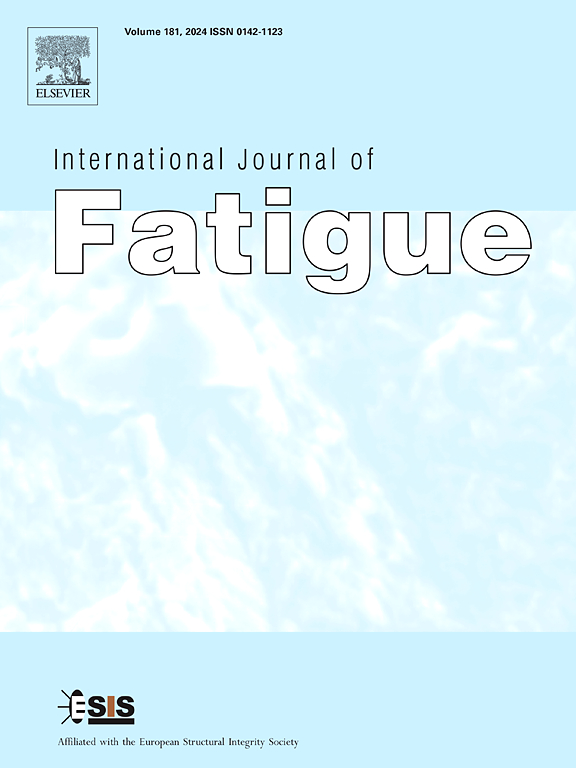激光粉末床熔融纯钽的高循环疲劳行为和强化机制
IF 5.7
2区 材料科学
Q1 ENGINEERING, MECHANICAL
引用次数: 0
摘要
最初探讨了激光粉末床熔融纯钽(LPBF-Ta)的疲劳行为和强化机制,并建立了疲劳寿命预测模型。在最佳激光能量密度(154.16 J/mm3)下制造的 LPBF-Ta 的疲劳强度为 348 MPa(106 次循环),与退火和冷加工的商业纯钽相比,分别显著提高了约 80% 和 50%。微观结构分析表明,平均尺寸为 300 nm 的细胞结构对强度的贡献为 438.2 MPa,是疲劳强度的主要贡献者。位错对细胞壁的破坏以及交叉滑移的激活确保了塑性,并最终提高了疲劳强度。此外,对缺陷的分析表明,内部缺乏融合孔隙会诱发二次疲劳裂纹,导致脆性裂纹扩展区域。此外,通过将裂纹源缺陷的尺寸考虑在内,建立了有限寿命预测模型,显著提高了疲劳寿命的预测精度。这些结果为制定 LPBF-Ta 的疲劳强化策略提供了指导。本文章由计算机程序翻译,如有差异,请以英文原文为准。
High cycle fatigue behavior and strengthening mechanisms of laser powder bed fusion pure tantalum
The fatigue behavior and strengthening mechanisms of the laser powder bed fusion pure tantalum (LPBF-Ta), coupled with a fatigue life prediction model, were originally explored. The fatigue strength of LPBF-Ta fabricated at the optimal laser energy density (154.16 J/mm3) is 348 MPa (106 cycles), showing a remarkable improvement of about 80 % and 50 % compared with that of the annealed and cold worked commercially pure tantalum, respectively. The microstructural analysis identifies that cellular structures averaging 300 nm in size contribute 438.2 MPa to strengthening, serving as the main contributor to fatigue strength. The breaching of cell walls by dislocations, along with the activation of cross-slip, ensures plasticity and ultimately enhances fatigue strength. Besides, the analysis of the defects reveals that the internal lack of fusion pore can induce the secondary fatigue crack, resulting in a region of brittle crack propagation. Furthermore, a finite life prediction model is established by originally incorporating the size of the crack source defect, and it significantly improves the prediction accuracy of the fatigue life. These results provide guidance for the development of fatigue strengthening strategies for LPBF-Ta.
求助全文
通过发布文献求助,成功后即可免费获取论文全文。
去求助
来源期刊

International Journal of Fatigue
工程技术-材料科学:综合
CiteScore
10.70
自引率
21.70%
发文量
619
审稿时长
58 days
期刊介绍:
Typical subjects discussed in International Journal of Fatigue address:
Novel fatigue testing and characterization methods (new kinds of fatigue tests, critical evaluation of existing methods, in situ measurement of fatigue degradation, non-contact field measurements)
Multiaxial fatigue and complex loading effects of materials and structures, exploring state-of-the-art concepts in degradation under cyclic loading
Fatigue in the very high cycle regime, including failure mode transitions from surface to subsurface, effects of surface treatment, processing, and loading conditions
Modeling (including degradation processes and related driving forces, multiscale/multi-resolution methods, computational hierarchical and concurrent methods for coupled component and material responses, novel methods for notch root analysis, fracture mechanics, damage mechanics, crack growth kinetics, life prediction and durability, and prediction of stochastic fatigue behavior reflecting microstructure and service conditions)
Models for early stages of fatigue crack formation and growth that explicitly consider microstructure and relevant materials science aspects
Understanding the influence or manufacturing and processing route on fatigue degradation, and embedding this understanding in more predictive schemes for mitigation and design against fatigue
Prognosis and damage state awareness (including sensors, monitoring, methodology, interactive control, accelerated methods, data interpretation)
Applications of technologies associated with fatigue and their implications for structural integrity and reliability. This includes issues related to design, operation and maintenance, i.e., life cycle engineering
Smart materials and structures that can sense and mitigate fatigue degradation
Fatigue of devices and structures at small scales, including effects of process route and surfaces/interfaces.
 求助内容:
求助内容: 应助结果提醒方式:
应助结果提醒方式:


